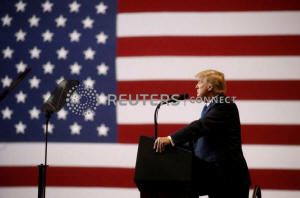|
Can a sitting U.S. president face
criminal charges?
 Send a link to a friend
Send a link to a friend
 [February 26, 2019]
By Jan Wolfe [February 26, 2019]
By Jan Wolfe
WASHINGTON (Reuters) - The U.S.
Constitution explains how a president can be removed from office for
"high crimes and misdemeanors" by Congress using the impeachment
process. But the Constitution is silent on whether a president can face
criminal prosecution in court, and the U.S. Supreme Court has not
directly addressed the question.
The question looms large with Special Counsel Robert Mueller preparing a
report on his investigation into Russia's role in the 2016 U.S.
election, whether President Donald Trump's campaign conspired with
Moscow and whether Trump unlawfully sought to obstruct the probe.
The U.S. Justice Department has a decades-old policy that a sitting
president cannot be indicted, indicating that criminal charges against
Trump would be unlikely, according to legal experts.
Here is an explanation of the rationale behind the Justice Department
policy and whether it applies to Mueller.
WHAT IS THE JUSTICE DEPARTMENT POLICY?
In 1973, in the midst of the Watergate scandal engulfing President
Richard Nixon, the Justice Department's Office of Legal Counsel adopted
in an internal memo the position that a sitting president cannot be
indicted. Nixon resigned in 1974, with the House of Representatives
moving toward impeaching him.

"The spectacle of an indicted president still trying to serve as Chief
Executive boggles the imagination," the memo stated.
The department reaffirmed the policy in a 2000 memo, saying court
decisions in the intervening years had not changed its conclusion that a
sitting president is "constitutionally immune" from indictment and
criminal prosecution. It concluded that criminal charges against a
president would "violate the constitutional separation of powers"
delineating the authority of the executive, legislative and judicial
branches of the U.S. government.
"The indictment or criminal prosecution of a sitting President would
unconstitutionally undermine the capacity of the executive branch to
perform its constitutionally assigned functions," the memo stated.
The 1973 and 2000 memos are binding on Justice Department employees,
including Mueller, according to many legal experts. Mueller was
appointed in May 2017 by the department's No. 2 official Rod Rosenstein.
But some lawyers have argued that the nation's founders could have
included a provision in the Constitution shielding the president from
prosecution, but did not do so, suggesting an indictment would be
permissible. According to this view, immunity for the president violates
the fundamental principle that nobody is above the law.
Nixon himself in 1977 offered an opposite view when he told interviewer
David Frost, "Well, when the president does it that means that it is not
illegal."
COULD MUELLER INDICT TRUMP DESPITE THE EXISTING POLICY?
Possibly. The Justice Department regulations governing Mueller's
appointment allow him to deviate from department policy in
"extraordinary circumstances" with the approval of the U.S. attorney
general, the nation's top law enforcement official. Trump appointee
William Barr currently holds that post.
[to top of second column]
|

President Donald Trump speaks during campaign rally at Mohegan Sun
Arena in Wilkes-Barre, Pennsylvania, U.S., August 2, 2018.
REUTERS/Leah Millis/File Photo

Some legal experts have suggested Mueller could invoke this
exception if he has uncovered serious wrongdoing and lacked
confidence in the ability of the divided Congress to hold Trump
accountable. Some lawyers also have said Mueller is not bound by the
1973 and 2000 memos because he is not a typical employee of the
department.
Ken Starr, who investigated President Bill Clinton in the 1990s in
the somewhat different role of independent counsel, in 1998
conducted his own analysis of the question of whether a sitting
president can be indicted, indicating he did not consider the 1973
Justice Department memo binding on him.
Starr did not indict Clinton in his investigation involving the
president's relationship with a White House intern named Monica
Lewinsky, but lawyers in his office concluded he had the authority
to do so, according to a once-secret internal memo made public by
the New York Times in 2017.
After the independent counsel statute under which Starr was named
expired in 1999, the Justice Department devised procedures governing
the appointment of special counsels to handle certain
investigations. Mueller was named after Trump fired FBI Director
James Comey, who had been overseeing the agency's Russia probe.
COULD TRUMP BE REMOVED FROM OFFICE AND THEN PROSECUTED?
Yes. There is no debate over whether a former president can be
indicted for conduct that occurred while in office. In fact,
President Gerald Ford, who succeeded Nixon after his resignation,
was mindful of this when he granted "a full, free, and absolute
pardon unto Richard Nixon for all offenses against the United States
which he, Richard Nixon, has committed or may have committed."
The statute of limitations - restricting the time within which legal
proceedings such as a prosecution may be brought - may work to
Trump's benefit if he is re-elected in 2020 and serves a full two
four-year terms as president until January 2025.
Many federal crimes have a five-year statute of limitations, meaning
prosecutors have five years from the date the conduct at issue
occurred to bring an indictment. That means criminal charges against
a re-elected Trump could be time-barred.

Some lawyers have said that, as a matter of fairness, the normal
rules on timeliness of charges should not apply to the president.
The issue potentially could be resolved in the courts.
(Reporting by Jan Wolfe; Editing by Will Dunham)
[© 2019 Thomson Reuters. All rights
reserved.]
Copyright 2019 Reuters. All rights reserved. This material may not be published,
broadcast, rewritten or redistributed.
Thompson Reuters is solely responsible for this content. |